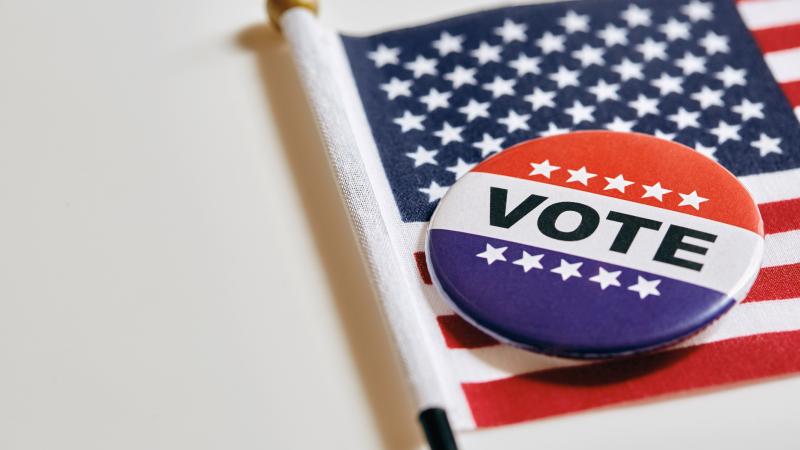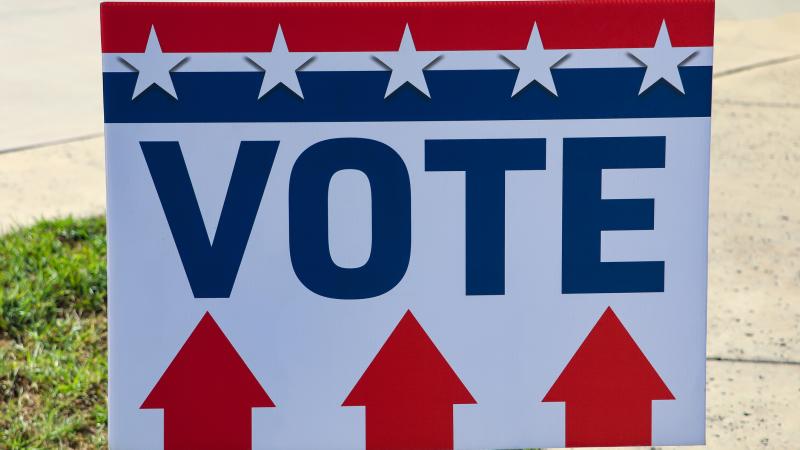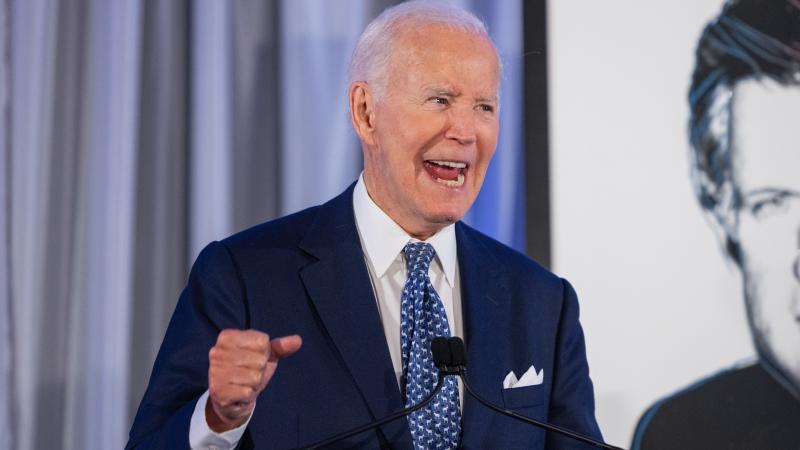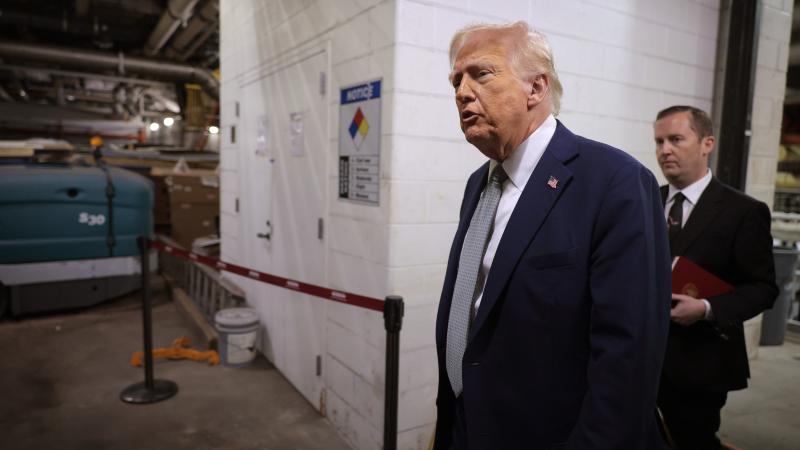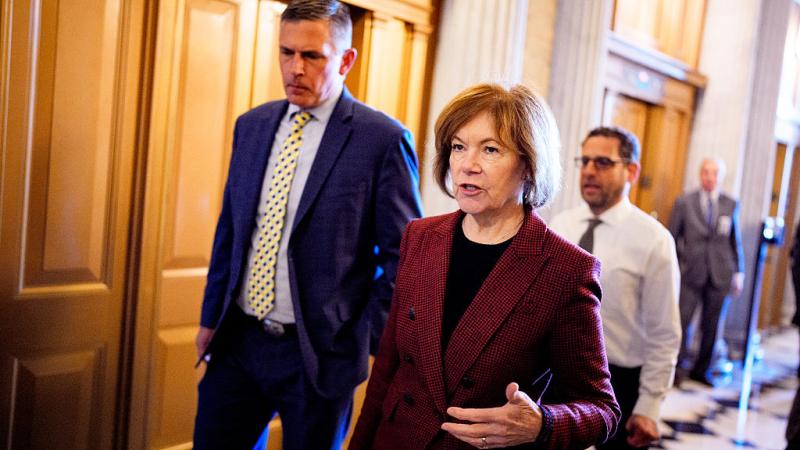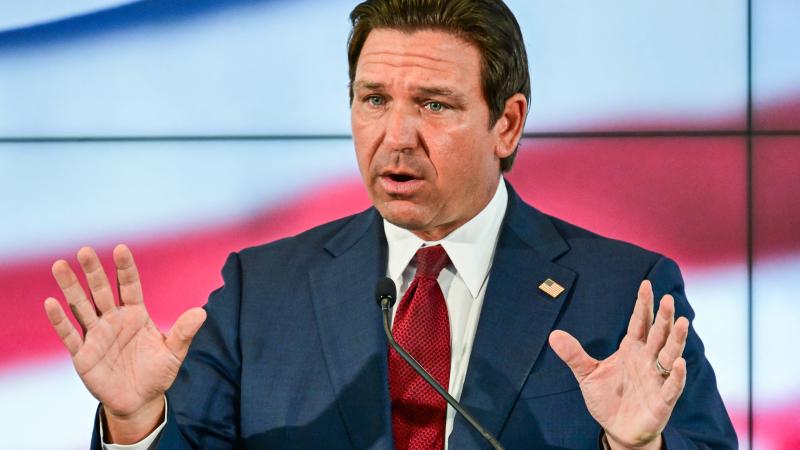Spanberger backed Big Tech censoring of Hunter Biden laptop stories as 'Russian propaganda' in 2020
Spanberger's support of Big Tech censorship came at a key moment in the 2020 election between Trump and Biden.
The current Democratic nominee to be Virginia governor — whose previous campaign ads featured a signer of the notorious Hunter Biden laptop letter — said she supported Big Tech's censorship of “Russian propaganda” during a congressional campaign debate, making the comment immediately following her opponent’s condemnation of social media companies for censoring stories about Joe and Hunter Biden.
Then-Rep. Spanberger, D-Va., made her comments during a debate with her unsuccessful challenger, Virginia State Del. Nick Freitas, R-Va., just a few weeks before the November election and just three days after the Hunter Biden laptop letter was published on October 19, 2020.
The debate moderator, Robert Costa, asked both candidates about the power of Big Tech in the economy and asked how Congress should regulate antitrust, privacy, and foreign interference issues with technology companies.
Freitas answered first, saying, “When it comes to Big Tech companies, I think one of the biggest problems that we’ve had — and we’ve seen this lately with Twitter and Facebook attempting to suppress information that was coming out about Hunter Biden and Joe Biden — is that they are trying to operate as a publisher, but they want the legal protections of a platform. A platform has the ability to put information out there so that people can have access to information, but they’re not supposed to selectively censor it in accordance with their own political views.”
“These big tech companies do have to understand that if they’re going to operate as a publisher, then they’re going to have to face the legal consequences when they deliberately censor information, simply because it doesn’t fit within their preferred political beliefs,” Freitas added.
Spanberger supports censorship
Spanberger then retorted that “I think it’s absolutely appropriate that tech firms should not be pushing Russian propaganda. And when it is, they are made aware that that exists by the United States’s FBI, they have an obligation to recognize the harm that propaganda from a foreign adversary nation can pose to our elections and our election systems.”
“I do believe that social media companies should be held accountable, they should be held to the same standards. When there’s a television ad on the TV or on the radio, you know who is putting that ad out there, and the same requirements must be placed on political ads and other ads that go on social media, and importantly, that disclaimer of who is paying to influence the viewer, the user, needs to follow that ad along,” Spanberger also said.
In October 2020, shortly before the presidential election, The New York Post released stories detailing Hunter Biden’s shady business dealings in China and Ukraine. When the publication attempted to post the articles on its Twitter account, the social media company said doing so violated its rule against sharing “hacked” materials. Facebook also limited the dissemination of the stories.
Days later, the infamous laptop letter helped contribute to the baseless narrative that the Hunter Biden laptop stories were nothing but a product of Russian disinformation — a narrative seized upon by Joe Biden’s 2020 campaign and spread by some of the laptop letter signers.
Spanberger did not respond to a request for comment sent to her by Just the News through her gubernatorial campaign.
Islamic connections an issue
In her congressional runs in both 2018 and 2020, Spanberger would push back on GOP criticisms about her work at the Islamic Saudi Academy in northern Virginia by releasing ads featuring ex-CIA officer John Sipher, who would go on to sign the infamous Hunter Biden laptop letter in October 2020.
Spanberger tweeted on September 11, 2018 that “in our latest TV ad, John Sipher, a 28-year veteran of the CIA’s National Clandestine Service, discusses my work protecting Americans and keeping our country safe from threats.”
Sipher said in the ad that “associating Abigail with terrorism is laughable.” He argued: “The CIA trusted her with top secret security clearances. For Dave Bratt or anybody else to twist that and turn it against her and claim that Abigail aided terrorists? It’s dangerous and unpatriotic.”
Spanberger again turned to Sipher for a September 2020 ad pushing back against Republican criticisms of her work at the Saudi academy.
“Abigail Spanberger was one of our quiet warriors who worked overseas […] Abigail put her life on the line to serve our country […] These attacks against her have been discredited and condemned. To suggest that somehow she is unpatriotic is not just absurd, it is disgusting.”
Sipher, a co-founder of Spycraft Entertainment and a senior fellow at the Atlantic Council, previously said he was proud to have played his part in influencing the 2020 election in favor of Biden — before backtracking and claiming he was being sarcastic.
Sipher later donated $250 to Spanberger’s congressional campaign in 2022, according to Open Secrets.
The laptop letter signer said this June on the Jack Hopkins Show that “some of the people that I've gotten to meet since I've retired and become friends with in the political space, who I really am impressed by, are women like Abigail Spanberger, who's running for governor here in Virginia.”
Hopkins told Sipher that “you're somebody I know I would enjoy having a beer with.” Sipher replied that they should get drinks with Denver Riggleman, a former Republican congressman from Virginia who worked with Hunter Biden’s lawyers to undercut stories about the laptop.
“Well, that's what we need to do,” Sipher said. “We need to go to Denver Riggleman's place and get free bourbon from him. I think he owes that to us. Yes, and I think I can get one of the Vindmans there and maybe I can get Abigail Spanberger.”
Laptops and lies
Sipher’s Mission Implausible podcast appears to have done three episodes focused on the Hunter Biden laptop saga in 2024 at the height of special counsel David Weiss’s investigation into Joe Biden’s son. The episodes featured Riggleman, anti-Trump former Rep. Adam Kinzinger, R-Ill., and fellow laptop letter signer Douglas Wise.
Sipher said in late November last year, after Trump had defeated then-Vice President Kamala Harris, that he saw “Abigail Spanberger” as one of the top future leaders of the Democratic Party. He posted on Bluesky in March, “Governor Spanberger, 2025!” Sipher declared on that social media site in June that “the women must save us” and pointed specifically to “Spanberger.”
Sipher published a story for The Bulwark in March titled, “Trump Is Still Obsessed With the Hunter Biden Laptop Letter. But it doesn’t seem like he or his supporters actually know what we said.”
“The first major story about the letter ran under the headline: ‘Hunter Biden story is Russian disinfo, dozens of former intel officials say.’ We never said the story was false — only that its appearance may have been the work of the Russian government and that it gave Russia an opportunity to manipulate American voters,” Sipher wrote.
Backtracking on statements about laptop letter
Although the October 2020 letter hedged a bit at various times, it did repeatedly contend there was Russian involvement with the laptop stories, arguing that “if we are right, this is Russia trying to influence how Americans vote in this election” and expressing “our view that the Russians are involved in the Hunter Biden email issue.” The letter claimed that the laptop saga “has all the classic earmarks of a Russian information operation” and that “our experience makes us deeply suspicious that the Russian government played a significant role in this case.”
Unmentioned by Sipher in his article was that the letter was directly pitched to signers as giving Biden a “talking point” against Trump. Sipher did not respond to a request for comment from Just the News sent to him through his company.
Former Acting CIA Director Michael Morell said future Secretary of State Antony Blinken “triggered” him to craft the laptop letter.
Joe Biden said during the October 2020 debate with Trump, “There are 50 former national intelligence folks who said that what he’s accusing me of is a Russian plan. They have said this is, has all the — four, five former heads of the CIA. Both parties say what he’s saying is a bunch of garbage.”
The then-future and now-former president was referring to the Politico report by Natasha Bertrand on Oct. 19, 2020 titled “Hunter Biden story is Russian disinfo, dozens of former intel officials say” which had first shared the letter.
FBI agent Elvis Chan and Foreign Influence Task Force section chief Laura Dehmlow met with Facebook on Oct. 14, 2020 — the day The New York Post published its story on the Hunter Biden laptop. Dehmlow also met with Twitter that day.
At this time, the FBI had the laptop in its possession and had long known that it was real. Documents published by Rep. Jim Jordan, R-Ohio, show that when a Twitter representative asked whether the laptop was real, an FBI agent said "yes," but an FBI lawyer jumped in, cutting him off with, "No further comment."
House Republicans revealed that Dehmlow then said the FBI held emergency deliberations on how to respond to the question going forward. When the Facebook meeting was held later in the day, the FBI simply said "no comment" when asked whether the Hunter Biden story was factual. Chan himself argued that “at the time we had not confirmed that the FBI was actually investigating Hunter Biden. So she did not have the authority to say anything or to comment about it.”
The GOP-led House Judiciary Committee argued in 2024 that “the FBI made this decision despite possessing the laptop and having determined that it was authentic and, thus, not the product of Russian propaganda.”
IRS whistleblowers previously revealed that the FBI verified the authenticity of Hunter Biden’s laptop in late 2019 — nearly a year before the Post stories and the laptop letter.
Sources familiar with the situation previously told Just the News that Chan, who had defied a congressional subpoena to testify about his role in the FBI’s social media censorship activities, was removed from his FBI post in San Francisco earlier this year. It was reported by the Independent Newsroom in May that Chan “has been placed on ‘terminal leave’ and has not accessed his agency devices for over a month.”
Too little, too late
The day after Twitter blocked The New York Post’s mid-October stories on Hunter Biden, then-Twitter CEO Jack Dorsey tweeted: “Straight blocking of URLs was wrong, and we updated our policy and enforcement to fix.”
Dorsey testified before the Senate in November 2020 after Joe Biden defeated Trump.
“We made a quick interpretation, using no other evidence, that the materials in the article were obtained through hacking, and according to our policy, we blocked them from being spread,” Dorsey said. “Upon further consideration, we admitted this action was wrong.”
Facebook founder Mark Zuckerberg has suggested his platform blocked the Hunter Biden laptop stories as disinformation at the urging of the FBI.
Chan’s 2022 testimony in a freedom of speech case confirmed that the bureau ran an operation during the 2020 election that requested social media companies remove content as disinformation, suggesting the government’s requests succeeded about half of the time and were conducted with a "headquarter stamp of approval."
Asked how frequently his unit succeeded in getting posts blocked, Chan testified: "I would not say it was a 100 percent success rate. If I had to characterize it, I would say it was like a 50 percent success rate. But that's just from my recollection."
Chan, in his deposition for the lawsuit brought by then-Missouri Attorney General Eric Schmitt and Louisiana Attorney General Jeff Landry, claimed his unit did not direct Twitter and Facebook to block the New York Post and that the Hunter Biden issue was never raised in government meetings he attended with officials from Homeland Security's Cybersecurity and Infrastructure Security Agency (CISA) and the social platforms. Hunter Biden came up only one time when a Facebook executive asked whether the FBI had a probe of the future president's son and agents declined to answer the question, Chan said.
"Hunter Biden was not — in my recollection, Hunter Biden was not referred to in any of the CISA USG-industry meetings," Chan testified.
"From my recollection, one meeting with Facebook after the regular agenda had been completed, one of the Facebook analysts asked if the FBI had any information they could share about the Hunter Biden investigation," Chan added. "To that I recall [FBI official] Ms. Laura Dehmlow saying that the FBI had no comment."
Chan testified in the freedom of speech case that he “was confident that [he] was not a party to any meeting with social media companies where Hunter Biden was discussed outside of the [Facebook-FITF bilateral meeting]” and that he had “no internal knowledge of [the Hunter Biden] investigation.”
A House Republican report from last year said that Chan’s testimony was “contradicted” by an FBI analyst who told congressional investigators that he messaged Chan and “mentioned that there was an ongoing investigation” on the morning of October 14, 2020.
Jordan previously published an internal Facebook document showing that Chan had a "follow up" call with the social media platform on Oct. 15, 2020 — one day after the initial meeting.
A Facebook employee who is a former FBI agent wrote on Oct. 15, 2020 that "Chan advised that he was up to speed on the current state of the matter within the FBI," according to messages published by Jordan.
Chan figured prominently in that October 2024 report by the GOP-led Committee on the Judiciary and the Select Subcommittee on the Weaponization of the Federal Government which was titled, “Election Interference: How the FBI ‘Prebunked’ a True Story about the Biden Family’s Corruption in Advance of the 2020 Presidential Election.”
The GOP report said that “the roots of the FBI’s 2020 'prebunking' scheme dated back to the 2016 presidential election, after which emerged sensationalized accounts that foreign ‘disinformation’ had affected the integrity of the election” and that “fueled by left-wing election denialism, a cottage industry of pseudoscientists, think tanks, and university centers sprung up to combat the alleged rise in misinformation and disinformation, which they held responsible for President Trump’s victory.”
Social media in bed with Biden White House
The FBI “formed the Foreign Influence Task Force to coordinate with social media companies and prevent alleged foreign disinformation from reaching American voters,” the Republican report argued, adding that “these entities worked together and with social media companies to censor speech—disproportionately conservative speech—all in the name of stopping disinformation and, ironically enough, promoting democracy.”
The GOP report said that “FBI agents — typically Elvis Chan, Assistant Special Agent in Charge of the FBI’s San Francisco Field Office — scheduled FITF bilateral meetings with social media companies quarterly, with additional calls or meetings on an ad hoc basis.”
Chan “confirmed that in bilateral meetings, the FBI discussed platforms’ policies regarding hacked materials and how the policies might apply to potential foreign influence operations,” the Republican report said.
Attorney General Pam Bondi announced in February that “the Foreign Influence Task Force shall be disbanded” in order to “free resources to address more pressing priorities and end risks of further weaponization and abuses of prosecutorial discretion.”
Chan told lawyers for the Missouri and Louisiana attorneys general in a lawsuit over social media censorship that he supervised a "command post" in his home city that helped the nationwide disinformation censorship operation function in fall 2020.
He described a sprawling operation that enlisted the help of FBI field offices around the country, federal prosecutors, and FBI and Justice Department lawyers before his unit would make the final request to social media to block content deemed by the operation to be disinformation or in violation of each company’s term of service.
“Social-media platforms updated their policies in 2020 to provide that posting ‘hacked materials’ would violate their policies. According to Chan, the impetus for these changes was the repeated concern about a 2016-style ‘hack-and-leak’ operation,” Judge Terry Doughty of the U.S. District Court for the Western District of Louisiana said in a July 2023 ruling. “Although Chan denies that the FBI urged the social-media platforms to change their policies on hacked material, Chan did admit that the FBI repeatedly asked the social-media companies whether they had changed their policies with regard to hacked materials because the FBI wanted to know what the companies would do if they received such materials.”
The judge wrote that “most of the time, the emails flagging the misinformation would go to seven social-media platforms. During 2020, Chan estimated he sent out these emails from one to six times per month. … When the FBI sent these emails, it would request that the social-media platforms report back on the specific actions taken as to these indicators and would also follow up at the quarterly meetings.”
The 5th Circuit Court of Appeals in September 2023 upheld the lower court decision in Missouri v. Biden barring the federal government from working with social media companies to remove content protected by the First Amendment.
Yoel Roth said in a December 2020 declaration to the Federal Election Commission that he was head of site integrity at Twitter, which is part of Twitter’s Trust and Safety Department.
“Since 2018, I have had regular meetings with the Office of the Director of National Intelligence, the Department of Homeland Security, the FBI, and industry peers regarding election security,” Roth said. “During these weekly meetings, the federal law enforcement agencies communicated that they expected ‘hack-and-leak operations’ by state actors might occur in the period shortly before the 2020 presidential election, likely in October.”
Roth added: “I was told in these meetings that the intelligence community expected that individuals associated with political campaigns would be subject to hacking attacks and that material obtained through those hacking attacks would likely be disseminated over social media platforms, including Twitter. These expectations of hack-and-leak operations were discussed throughout 2020. I also learned in these meetings that there were rumors that a hack-and-leak operation would involve Hunter Biden.”
He said his team “determined that the information in the articles could have been obtained through hacking” and that his team “escalated” the articles for further review. Roth said Twitter’s Trust and Safety leadership then determined the articles “violated the Distribution of Hacked Materials Policy,” and the leadership group “instructed the Site Integrity Team to execute enforcement.”
Roth said his team then blocked Twitter users from sharing links to the New York Post articles. He said he did not discuss it with any Biden campaign representatives prior to censoring the articles.
He also testified in February 2023 that “Twitter and other tech companies worked to build closer information-sharing relationships with law enforcement such as the FBI” in the lead up to the 2020 election to deal with “threats” posed by Russian disinformation efforts similar to those in 2016.
An October 2020 complaint from the RNC alleged that “through its ad hoc, partisan oppression of media critical of Biden, [Twitter] is making illegal, corporate in-kind contributions as it provides unheard-of media services for Joe Biden’s campaign.” The FEC rejected the complaint in August 2021.
Independent investigative journalist Catherine Herridge tweeted in early April “for the first time, and with a change of administration, the FBI has now turned over to GOP House investigators the internal chat messages that show Bureau leadership actively silenced its employees.”
In the chat messages, an individual whose name was redacted messaged Chan that there was a “gag order” on discussion of Hunter Biden’s laptop.
Chan asked in the chat, “actually what kind of case is the laptop thing? corruption? campaign financing?” Another FBI employee responded, “CLOSE HOLD —” with the rest of the response redacted. Chan responded, “oh crap … ok. It ends here.”
Chan was also asked in the chat if “Anyone discussing that NYPost article on the Biden’s?” Chan responded, “yes we are. c d confirmed an active investigation. No further comment.” It is likely that “C D” referred to the FBI’s Criminal Division.
Sens. Chuck Grassley, R-Iowa, and Ron Johnson, R-Wisc., sent a letter to FBI Director Kash Patel in April in response to that report.
Whistleblower info confirmed
“These October 2020 internal messages appear to corroborate whistleblower information that we previously released highlighting the FBI’s widespread efforts to downplay and undermine investigatory steps relating to Hunter Biden and not just the laptop,” Grassley and Johnson wrote.
The senators pointed to a July 2022 letter Grassley wrote about whistleblower disclosures indicating that, in August 2020, “there was a scheme in place among certain FBI officials to undermine derogatory information connected to Hunter Biden by falsely suggesting it was disinformation.”
The GOP senators also told Patel that, in August 2020, “we were provided an unnecessary briefing by the FBI’s Foreign Influence Task Force that was designed to undermine our investigation into the Biden family.”
The letter from the senators also said that, in August 2022, Johnson learned from whistleblowers that after the FBI obtained the Hunter Biden laptop in late 2019, local FBI leadership told employees, “you will not look at that Hunter Biden laptop.”
The Facts Inside Our Reporter's Notebook
Links
- debate
- asked
- answered
- added
- retorted
- said
- seized upon by Joe Bidenâs 2020 campaign
- spread by some of the laptop letter signers.
- Islamic Saudi Academy
- releasing
- ads
- tweeted
- ad
- co-founder
- senior fellow
- backtracking
- donated
- said
- worked with
- podcast
- said
- posted
- declared
- Hunter Biden story is Russian disinfo, dozens of former intel officials say.
- wrote
- letter
- âtalking pointâ
- Michael Morell
- during the October 2020 debate with Trump
- report
- met with Facebook
- published
- the FBI verified the authenticity of Hunter Bidenâs laptop
- previously told
- reported
- tweeted
- Dorsey said.
- suggested
- testimony
- published an internal Facebook document
- wrote
- figured prominently
- announced
- supervised a "command post"
- July 2023 ruling.
- upheld the lower court decision
- declaration
- testified
- complaint from the RNC
- rejected the complaint
- tweeted
- sent a letter
- July 2022 letter
- provided an unnecessary briefing
- told
